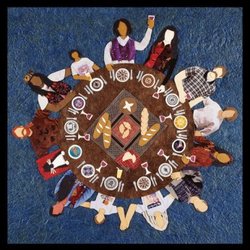 In Tell Us Our Names: Story Theology from an Asian Perspective, C.S. Song turns on its head pre-Communist era missionaries’ complaints against some Chinese converts being more interested in feeding their stomachs than their souls. The hungry suspects were accused of being “rice Christians”. He writes that, “we celebrate Christ’s divine presence in the eucharist… [because] in Christ the divine future,” a Kin-dom of God wherein all stomachs will be fed, “becomes the human present.” He writes of the hungry suspects: Rice determined their present and their future. Rice brings a concrete content to all talk about the future, about the world to come, and about the kingdom of God. For those who subsist on rice, can there be a future without rice? Can there be a world to come where they must struggle again for rice? . . . Understanding rice in this way, Christians in China should have been proud to be “rice Christians.” They should have represented this kind of “rice Christianity” to their rice-hungry compatriots. Preachers should have preached “rice sermons” to their famished audiences… theology must serve the God of the present- a God whose pockets are full of rice.1 Here among the rice Christians and all our third world kin is a theology that is intimately concerned with the re/distribution of wealth and power at the table: the grass-roots and indeed grass-basket2 theologians seeking communal survival, local sovereignty over land and culture, national sovereignty in matters of the state, and just dealings in the global economy. They seek freedom from subjugation under the systems of oppression built into their own societies—sexism, racism, colorism, homophobia, ableism, tribalism, caste and class, and so on. They seek freedom from subjugation under the triple threat of Western religious systems, economic systems and military systems, which together enmeshed create systematic theologies of systematic land grabbing, wealth extraction, the displacement of peoples from rural/native lands to urban factories, brothels, and slums, international diaspora, and ultimately, the total annihilation of everyone and everything. In their unique struggles for survival and justice, they seek not only to be fed according to their need (though this they must be): Kwok Pui Lan’s “decentered, multi-centered, displaced, relocated peoples who criss-cross many borders"3 come to the table carrying a feast of experience and wisdom for the poor famished theologians of the West. While Kwok writes from the location of third wave and third world feminist theologians, it can be said that all whose bodies and souls are crossed by the true borders of holy diversity and false borders of kyriarchy4 (which is to say, all)5 find themselves in decentered, multi-centered contexts and frequently criss-cross borders. Queer white activists, working class white heterosexual men, “first world” people living with disabilities, elite two-thirds world theologians, and their likewise poor-but-rich/rich-but-poor brethren live decentered, multi-centered lives across and in between multiple borders. What does this mean for us who gather at the table? How shall we strive toward roundtable missions of mutual solidarity? On a personal level within each of us are hungry “stomachs” that God fills up with good things. There are also “stomachs” full to the brim with the unearned bread of privilege that are sent away empty or emptied as it must be the case in a re/distribution of wealth and power.6 Both of these parts are ultimately healed and integrated by the grace of God’s action in the world in Christ Jesus. On an interpersonal level, where the satisfied once bent to feed the hungry in soup lines with uncrossable boundaries between heavy ladled servers and hungry guests, a newly articulated community may now feed one another in roundtable missions. It is in the breaking of bread in such roundtable missions that the “they” of “they the poor who seek freedom from subjugation…” loses three letters and grows inestimably larger by the puckered-lipped wooing of a “w”; we. (Such it is in the upside-down Kin-dom of God that something looks smaller and gets bigger.) When the community of God moves from “they” theology to “we” theology its members become self-interested participants in emancipation from the multiple oppressions that subjugate everyone to the satanic multiplicity of the powers and principalities; then all who hunger for bread and justice will be fed. The task therefore is to locate ourselves and “discern theology in a true multiplicity”7 at the table. This will illumine what would make for roundtable missions of mutual exchange and inevitably lead to the discernment of how wealth and power are to be re/distributed in the community of God; that is, how each one will feed and be fed according to her unique gifts and personal need, and the unique gifts and needs of those others at the table. Lutheran womanist theologian Rev Dr. Beverly Wallace writes, “Only in the inclusion of multiple perspectives can we know more fully the picture of humankind, the [hungers]… of God’s people…”8 We will learn to build roundtable ministries only by building a shared understanding of what would feed all of God’s people from the unique, embodied experiences and theologies of all God’s people. Yet this is a deeply challenging task, to hear this multiplicity of voices, the gnawing and belching of our bellies in balance, when unequal power dynamics continue to silence and amplify the hunger of some in the circle.9 There are several steps Christian communities can take to mitigate the acute recreation of systems of oppression in our midst.10 First we must acknowledge that the main event in the life of our communities will never be what we do for ourselves nor what we do for God, but rather, what God does for us.11 This should be a matter of great relief to us, as while our own mortal faithfulness is deeply vulnerable, God’s grace is perfect and invulnerable. While we will inevitably fail in perfecting our own hearts and minds, God’s grace will never fail a community open to being transformed by it. Therefore our most fervent prayers must be directed in pre-emptive gratitude for the knowledge of God’s transformative grace, certain to create, redeem, and sanctify our communities in ways we cannot fathom or anticipate and will not fully comprehend, save perhaps for in retrospective wonder. This kind of prayer will help break us of self-righteousness, self-satisfaction, and self-reliance. We cannot do without this first step. Next we must become students and practitioners of practical, systematic approaches to building roundtable missions. Complaints and good intentions alike must be followed by experimentation in methods of change lest communities become stalled in bitterness or sentimentality. While we rely entirely on God’s grace in building roundtable missions, the methods we practice may be likened to channels and trenches used to direct God’s holy water. There are many models for uprooting oppression in our communities. To offer one of many, the Hosanna! People’s Seminary approach is to discern particular areas of privilege and poverty within a community through a three part process: awareness of privilege and oppression in the community; accountability in the community to the oppressed party and to the continued education and development of the privileged party in the area of ally training; and solidarity in relationship with the oppressed party or those allying with the oppressed party outside of the community. Image from Jan L. Richardson. Notes:
Comments
|
Disclaimer
The viewpoints expressed in each reader-submitted article are the authors own, and not an “official Jesus Radicals” position. For more on our editorial policies, visit our submissions page. If you want to contact an author or you have questions, suggestions, or concerns, please contact us. CategoriesAll Accountability Advent Anarchism Animal Liberation Anthropocentrism Appropriation Biblical Exegesis Book Reviews Bread Capitalism Catholic Worker Christmas Civilization Community Complicity Confessing Cultural Hegemony Decolonization Direct Action Easter Economics Feminism Heteropatriarchy Immigration Imperialism Intersectionality Jesus Justice Lent Liberation Theology Love Mutual Liberation Nation-state Nonviolence Occupy Othering Pacifisim Peace Pedagogies Of Liberation Police Privilege Property Queer Racism Resistance Resurrection Sexuality Solidarity Speciesism Spiritual Practices Technology Temptation Veganism Violence War What We're Reading On . . . White Supremacy Zionism ContributorsNekeisha Alayna Alexis
Amaryah Armstrong Autumn Brown HH Brownsmith Jarrod Cochran Chelsea Collonge Keith Hebden Ric Hudgens Liza Minno Bloom Jocelyn Perry Eda Ruhiye Uca Joanna Shenk Nichola Torbett Mark VanSteenwyk Gregory Williams Archives
October 2017
|
Search by typing & pressing enter


 RSS Feed
RSS Feed